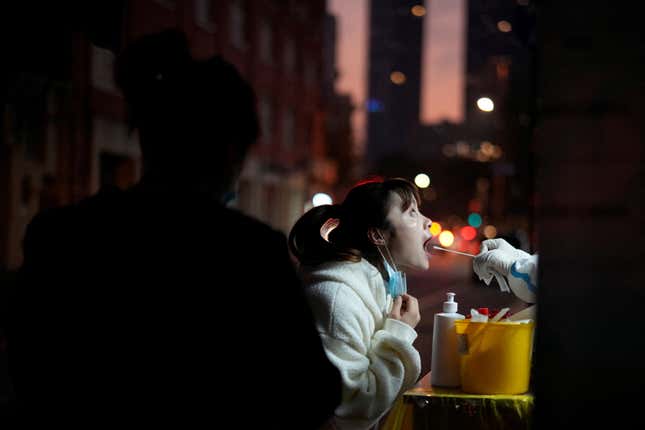
Beijing’s announcement last Friday (Nov. 11) of marginally revised covid rules kicked off an optimistic surge in Chinese stocks. One of the biggest winners has been Shijiazhuang Yiling Pharmaceutical, whose share price has surged nearly 24% since last week.
Yiling Pharmaceutical is the developer and manufacturer of Lianhua Qingwen, traditional Chinese medicine tablets that Chinese authorities have touted as being effective in treating covid, despite the lack of publicly available and peer-reviewed clinical trial data to support that claim.
The main ingredients in the pill, developed in 2003 to treat severe acute respiratory syndrome (SARS), include Japanese honeysuckle, rhubarb root, and the fruit of the forsythia plant. Since then, China’s ministry of health and the national health commission have recommended Lianhua Qingwen for colds and influenza. The pills are staples in home medicine cabinets (link in Chinese).
The big business of covid herbal pills
According to the state-run newspaper Beijing Business Today, some pharmacies in the northern city of Shijiazhuang — one of the first to cautiously inch away from strict covid rules — have been swept clean of Lianhua Qingwen supplies, as residents stockpile the tablets (link in Chinese).
That makes for lucrative business for the Yiling Pharmaceutical, a company headquartered in Hebei province. Yiling got its start in 1992 with a herb-and-insect pill marketed as a treatment for heart disease. According to its half-yearly report, the company’s traditional Chinese cold and flu remedies — including Lianhua Qingwen tablets — now represent 46% of total revenue.
Yiling’s other products are also predominantly herbal, such as a herbal capsule that purportedly treats impotence, fatigue, and forgetfulness, and another set of pills that claim to treat cardiovascular ailments.
According to company filings, Yiling has received 50 million yuan ($7 million) in government subsidies to carry out clinical research on Lianhua Qingwen, and to register it internationally.
Touted in China, warned against in Singapore, banned in Australia
While Chinese health authorities have, since April 2020 (link in Chinese), included Lianhua Qingwen among recommended treatments for mild covid cases, there are no published results to date from any randomized clinical trial on the efficacy and safety of these tablets.
In fact, Singapore’s health authorities warned earlier this year that there is “no scientific evidence” showing that Lianhua Qingwen can treat or alleviate covid symptoms. Australia has banned Lianhua Qingwen because it includes a key ingredient used to make methamphetamine, or meth. And the US’s Food and Drug Administrationhas warned vendors against the unauthorized sale of Lianhua Qingwen. A Chinese billionaire’s son has also prominently questioned the efficacy of Lianhua Qingwen on Weibo; he was swiftly banned from the social media platform.
In Hong Kong, the government has actively promoted the use of Lianghua Qingwen to treat covid. Initially, authorities appeared to stumble in trying to walk a fine line between supporting Beijing’s zeal for traditional herbal covid treatments, and upholding the city’s reputation for stringent food and drug safety standards. In the spring, as cases and death rates soared, the city government distributed two boxes of the herbal pills to every household—barely two weeks after local health authorities urged patients to consult a traditional Chinese medical practitioner before taking the tablets.
There is currently one active registered clinical trial under way in Singapore to test Lianhua Qingwen. The trial will determine how effective the tablets are in reducing the duration of symptoms in fully vaccinated, mild-covid patients, according to the US government’s registry of clinical trials. The study aims to recruit 300 participants, and is scheduled for completion by late 2023.